National
WHAT A YEAR!
Our picks for the top national and international stories of 2013

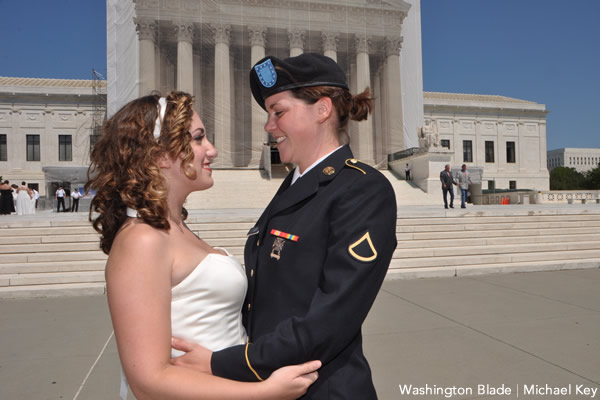
(Washington Blade file photo by Michael Key)
It was perhaps the biggest year yet for the LGBT rights movement in the United States, as the Supreme Court made history by striking down Prop 8 and part of the Defense of Marriage Act. More states legalized marriage in its wake. Elsewhere in the world, the Catholic Church got a new pope who seemed to break with his predecessor over gay rights, among other issues.
Here are the Blade staff’s picks for the year’s top 10 national and international stories.
#1 Supreme Court strikes down DOMA, Prop 8
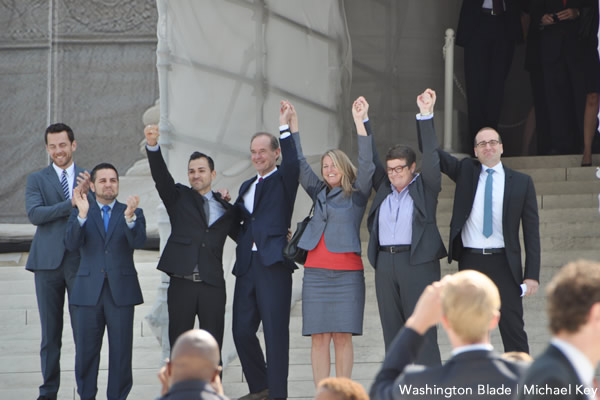
The plaintiffs in the Proposition 8 case at the Supreme Court emerge victorious with lawyer David Boies, Human Rights Campaign President Chad Griffin and American Foundation for Equal Rights Executive Director Adam Umhoefer. (Washington Blade file photo by Michael Key)
The U.S. Supreme Court issued a pair of historic decisions against the Defense of Marriage Act and California’s Proposition 8 in a news event we have dubbed the story of the year.
In a 5-4 decision, the court struck down Section 3 of DOMA, the 1996 Clinton-era law that prohibited the federal government from recognizing same-sex marriage. In a separate 5-4 decision issued at the same time, the court ruled the proponents of Prop 8 couldn’t defend the initiative in court, allowing a district court ruling to stand that determined the 2008 amendment was unconstitutional.
Writing for the majority in the decision against DOMA, U.S. Associate Justice Anthony Kennedy emphasized the harm the anti-gay law causes married same-sex couples.
“The federal statute is invalid, for no legitimate purpose overcomes the purpose and effect to disparage and to injure those whom the State, by its marriage laws, sought to protect in personhood and dignity,” Kennedy wrote. “By seeking to displace this protection and treating those persons as living in marriages less respected than others, the federal statute is in violation of the Fifth Amendment.”
The DOMA lawsuit was brought by New York widow Edith Windsor as a result of having to pay $363,000 in estate taxes in 2009 upon the death of her spouse, Thea Spyer. Windsor became a symbol of the marriage equality movement and was named by Time magazine as its No. 3 pick for “Person of the Year” after her victory at the Supreme Court.
The ruling against Prop 8 restored marriage equality to California. Thousands of same-sex couples — beginning with plaintiffs Kris Perry and Sandra Stier, who were wed by California Attorney General Kamala Harris at San Francisco City Hall — began to marry after the U.S. Ninth Circuit Court of Appeals gave the go-ahead weeks after the decision.
Immediately after the ruling against DOMA, the Obama administration pledged to work toward implementing the decision to allow for the recognition of same-sex marriage by the federal government. At a news conference during a trip to Africa, President Obama pledged to make the federal benefits of marriage as widely available as possible.
“It’s my personal belief — but I’m speaking now as a president as opposed to as a lawyer — that if you’ve been married in Massachusetts and you move someplace else, you’re still married, and that under federal law you should be able to obtain the benefits of any lawfully married couple,” Obama said.
Then-Secretary of Homeland Security Janet Napolitano issued guidance saying bi-national same-sex couples would be able to apply for marriage-based green cards to enable them to stay in the United States. The U.S. Office of Personnel Management announced that spousal benefits, including health and pension benefits, would begin to flow to gay federal employees. Perhaps most significantly, the Internal Revenue Service announced it would recognize the marriages of same-sex couples for tax purposes — even if they file tax returns while living in a non-marriage equality state.
Defense Secretary Chuck Hagel also announced that service members in same-sex marriages would be able to receive spousal benefits, including health, pension and housing benefits. Several national guards with state constitutional amendments banning same-sex marriage said they would be unable to process these benefits, but after a second edict from Hagel saying they must comply, each of those states fell in line.
Within a few short months, the ruling against DOMA also helped accelerate the path toward marriage equality throughout individual states. In Ohio, a federal judge recognized the marriage of a same-sex couple that married at BWI airport because one of the partners in the relationship was dying of Lou Gehrig’s disease. Later, a New Jersey superior court ruled the state’s civil union law was insufficient — a decision the State Supreme Court let stand upon appeal from New Jersey Gov. Chris Christie, who later the dropped the lawsuit.
Doug NeJaime, a gay law professor at the University of California, Irvine, said this movement so soon after the Windsor ruling “was anticipated” given the language that Associate Justice Anthony Kennedy used in his opinion.
“Given the flurry of activity, and the quick decisions coming out of places like Ohio, this may mean that the Supreme Court may not be able to avoid the question regarding the constitutionality of state marriage bans as long as some of the justices may hope,” NeJaime said.
#2 States, countries extend marriage rights
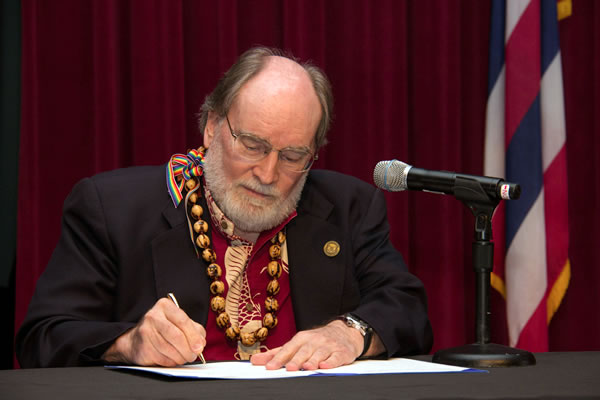
Hawaii Gov. Neil Abercrombie on Nov. 13, 2013, signed his state’s same-sex marriage bill into law. (Photo courtesy of State of Hawaii/Office of the Governor)
The movement for marriage rights for same-sex couples made significant advances in the U.S. and around the world in 2013.
In addition to Maryland and Delaware, gays and lesbians began to legally marry in California, Rhode Island, New Jersey, Minnesota and Hawaii. Illinois’s same-sex marriage law that Gov. Pat Quinn signed last month will take effect in June.
New Zealand and Uruguay also extended marriage rights to same-sex couples in 2013.
Brazil’s National Council of Justice in May nearly unanimously ruled that registrars in the South American country cannot deny marriage licenses to same-sex couples.
Gays and lesbians in England and Wales on March 29 will begin to exchange vows after the British Parliament over the summer approved a same-sex marriage bill. An identical measure cleared its first hurdle in the Scottish Parliament last month.
The legal process to extend marriage rights to same-sex couples in Mexico continued to gain ground in Baja California, Guanajuato, Jalisco and other states in 2013. A handful of gays and lesbians have exchanged vows in Colombia, but the country’s attorney general has challenged some of them.
Croatian voters on Dec. 1 approved a constitutional amendment that defines marriage as between a man and a woman. The Australia High Court on Dec. 11 ruled a law that extended marriage rights to same-sex couples in the country’s capital is unconstitutional.
#3 Senate passes ENDA; House version stalls
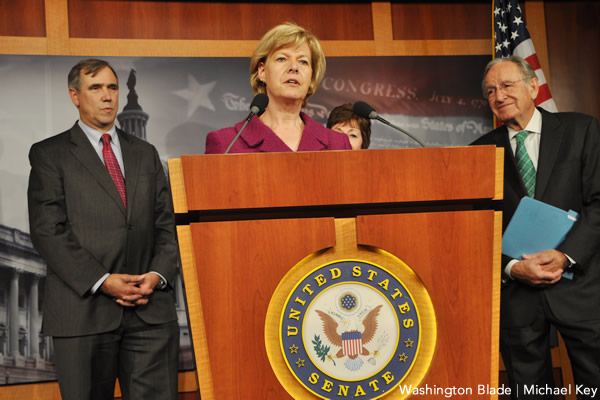
Sen. Tammy Baldwin (D-Wis.) spoke in a press conference following the passage of the Employment Non-Discrimination Act in the U.S. Senate. (Washington Blade photo by Michael Key).
For the first time in history, the U.S. Senate approved with bipartisan support this year a long sought piece of legislation that would bar employers from discriminating against or firing workers based on their sexual orientation or gender identity.
By a vote of 64-32, the Employment Non-Discrimination Act passed the Senate, marking the first time that either chamber of Congress has passed a version of the bill with protections for transgender workers. A total of 10 Republicans joined the entire Democratic caucus present in voting for the bill.
Prior to the vote, Sen. Jeff Merkley (D-Ore.), ENDA’s chief sponsor, delivered a speech on the Senate floor recognizing the historic nature of the moment.
“I look forward to this vote, this vote for liberty, this vote for freedom, this vote for opportunity, this vote for a fair and just America,” Merkley said.
Despite a push to bring up the legislation in the House, momentum on ENDA seems to have stalled as the legislation has capped out at 201 sponsors and House Speaker John Boehner (R-Ohio) has continually said he opposes it.
“I understand people have differing opinions on this issue, and I respect those opinions,” Boehner said in response to a question from the Washington Blade. “But as someone who’s worked in the employment law area for all my years in the State House and all my years here, I see no basis or no need for this legislation.”
#4 Russia’s LGBT crackdown sparks outrage
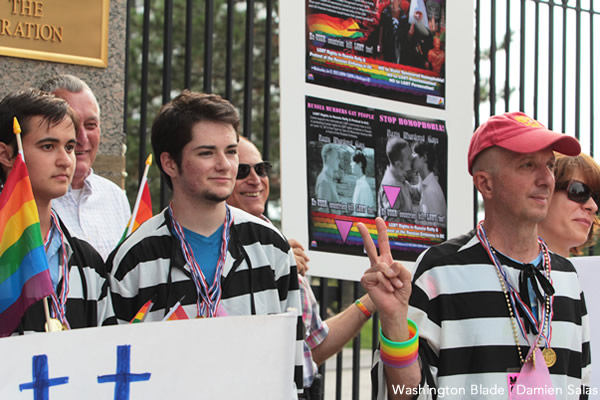
Activists protested in front of the Russian embassy several times throughout the year following the passage of anti-gay laws in the country. (Washington Blade photo by Damien Salas)
The Kremlin’s LGBT rights crackdown sparked widespread outrage this past year amid preparations for the 2014 Winter Olympics that will take place in Sochi, Russia, in February.
Russian President Vladimir Putin in June signed a broadly worded bill into law that bans gay propaganda to minors. A second statute that bans foreign same-sex couples and any couple from a country in which gays and lesbians can marry from adopting Russian children took effect in July.
LGBT rights groups and other organizations that receive funding from outside Russia could face a fine if they don’t register as a “foreign agent.”
“These laws are aimed at driving LGBT people back into silence, back underground, back to the invisibility,” Polina Andrianova of Coming Out, a St. Petersburg-based LGBT advocacy group, told the Washington Blade during an August interview.
Playwright Harvey Fierstein is among those who have called for a boycott of the Sochi games in response to Russia’s LGBT rights crackdown. The International Olympic Committee and the U.S. Olympic Committee have also faced criticism from those who feel they have not done enough to publicly criticize the Kremlin over the gay propaganda law.
“The U.S. Olympic Committee has been complicit in this act of aggression because they say we respect Russia’s right to do this,” U.S. Rep. Ileana Ros-Lehtinen (R-Fla.) told the Washington Blade in late September before the USOC added sexual orientation to its anti-discrimination policy. “That is not worthy of Olympic standards.”
Retired Olympic diver Greg Louganis on Dec. 13 told the Blade that gay MSNBC anchor Thomas Roberts should not have co-hosted the Miss Universe 2013 pageant in November in Moscow. The four-time gold medalist also said gay singer Elton John should not have performed in Russia earlier this month.
“It just seems like all they’re doing is lending credibility to what’s going on there,” said Louganis.
#5 LGBT Catholics welcome Pope Francis

‘If a person is gay and seeks the Lord and is of good will, who am I to judge him,’ said Pope Francis. (Photo by Agência Brasil; courtesy Wikimedia Commons)
LGBT Catholics in 2013 welcomed Pope Francis’ more moderate tone toward gays.
The College of Cardinals on March 16 elected the former archbishop of Buenos Aires to succeed Pope Benedict XVI who abruptly resigned in February.
The Argentine pontiff said during a September interview with an Italian Jesuit newspaper that the Roman Catholic church has grown “obsessed” with nuptials for gays and lesbians, abortion and contraception. These comments came roughly two months after he told reporters as he returned to Rome after a weeklong trip to Brazil that gays and lesbians should not be judged or marginalized.
“If a person is gay and seeks the Lord and is of good will, who am I to judge him?” said Francis in response to a question about gay priests.
LGBT rights advocates in Argentina noted to the Washington Blade the pontiff categorized the same-sex marriage bill the country’s president, Cristina Fernández de Kirchner, signed in 2010 as “the work of the devil” that would “spark God’s war.”
Dignity USA Executive Director Marianne Duddy-Burke acknowledged Francis’ anti-LGBT statements after his election. She remains optimistic the new pontiff will welcome LGBT Catholics back into the church.
“We find much to be hopeful about, particularly in the Pope’s firm desire that the church be a ‘home for all people,’ and his belief that God looks on lesbian, gay, bisexual and transgender people with love rather than condemnation,” said Duddy-Burke in a September statement.
#6 Obama names gay ambassadors, judges
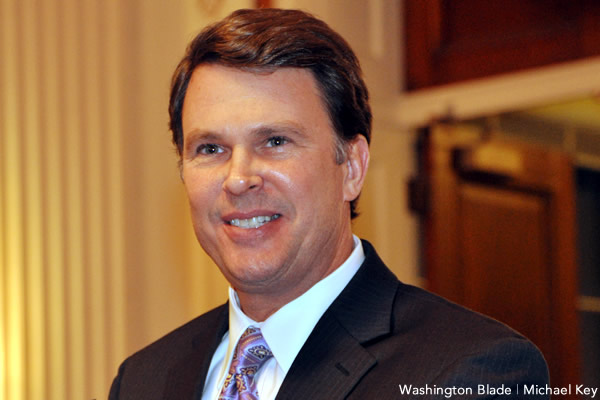
John Berry was named U.S. Ambassador to Australia. (Washington Blade file photo by Michael Key)
The U.S. Senate approved this year several openly gay appointees — including the first openly gay federal appeals judge — in confirmations that were historic both in number and significance.
Among the confirmed appointees were five openly gay ambassadors, including former U.S. Office of Personnel Management Director John Berry as U.S. ambassador to Australia. The confirmation made him the first openly gay U.S. ambassador to a G-20 country.
Also among the gay confirmations were Daniel Baer as U.S. ambassador to Organization for Security & Cooperation in Europe; Rufus Gifford as U.S. ambassador to Denmark; James Costos as U.S. ambassador to Spain; and James “Wally” Brewster as U.S. ambassador to the Dominican Republic.
Additionally, the Senate confirmed Eric Fanning as under secretary of the Air Force. After the departure of his immediate boss shortly after the confirmation, Fanning became acting secretary of the Air Force, making him the highest-ranking openly gay civilian in the U.S. military.
Chai Feldblum, the lesbian member of the U.S. Equal Employment Opportunity Commission, was confirmed for a second term after leading the way for a ruling instituting transgender workplace non-discrimination protections.
The Senate also confirmed openly gay judicial nominees. The highest-ranking among them was Todd Hughes, who was confirmed as circuit judge for the U.S. Court of Appeals for the Federal Circuit. He’s the first openly gay person to serve a federal appeals court.
The other confirmations were Pamela Ki Mai Chen as U.S. District Judge for the Eastern District of New York; Michael McShane as U.S. District Judge for the District of Oregon; and Nitza Quiñones Alejandro as U.S. District Judge for the Eastern District of Pennsylvania.
#7 Trans protections recognized under Title IX
The Obama administration made a historic ruling for transgender rights this year by applying existing law to protect students in school on the basis of their gender identity.
The Departments of Education and Justice announced the resolution as a result of a complaint filed by the National Center for Lesbian Rights on behalf of a transgender student in California’s Arcadia Unified School District. The resolution requires the school district to treat the student as male in all respects and keep his transgender status private.
NCLR Staff Attorney Asaf Orr commended the Obama administration for taking the step “to ensure that schools are safe and supportive environments where all students can thrive, including transgender students.”
The resolution represents a growing legal and administrative trend to interpret existing law — in this case, Title IX of the Education Act of 1972 — to ban discrimination against trans people.
Prior to the ruling, the student was required to sleep in a cabin by himself on an overnight field trip instead of being allowed to room with his male peers. The school district also excluded the student from the boys’ restroom and locker room, insisting that he use the nurse’s office.
The student, who remained anonymous, said he’s glad his school district agreed to put in place the resolution proposed by the Obama administration.
“Knowing that I have the school district’s support, I can focus on learning and being a typical high school student, like my friends,” the student said.
#8 Obama references Stonewall in inaugural speech
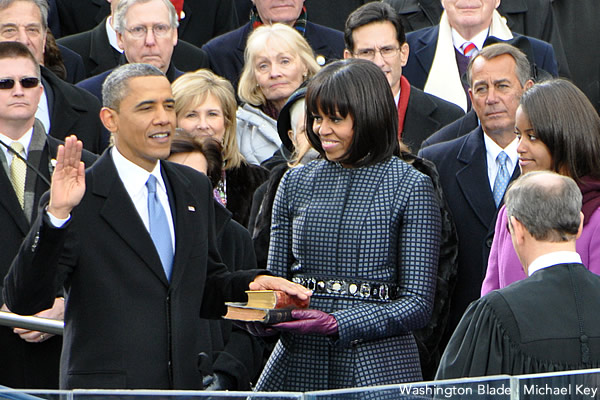
In a first, President Obama made two references to gay rights during his inaugural address in January. (Washington Blade file photo by Michael Key)
President Obama stirred passions in the LGBT community by making an unprecedented reference to LGBT rights during his second-term inaugural address and saying he believes gay people deserve equal treatment under the law.
“Our journey is not complete until our gay brothers and sisters are treated like anyone else under the law – for if we are truly created equal, then surely the love we commit to one another must be equal as well,” Obama said.
The words marked the first time that any U.S. president mentioned gay rights during an inaugural address and sent shockwaves through the LGBT community.
Also during the speech, Obama made a reference to the 1969 Stonewall riots, which are considered the start of the modern LGBT rights movement.
“We, the people, declare today that the most evident of truths – that all of us are created equal – is the star that guides us still; just as it guided our forebears through Seneca Falls, and Selma, and Stonewall; just as it guided all those men and women, sung and unsung, who left footprints along this great Mall, to hear a preacher say that we cannot walk alone; to hear a King proclaim that our individual freedom is inextricably bound to the freedom of every soul on Earth,” Obama said.
#9: Gay mayors in Seattle, Houston; Quinn loses in New York
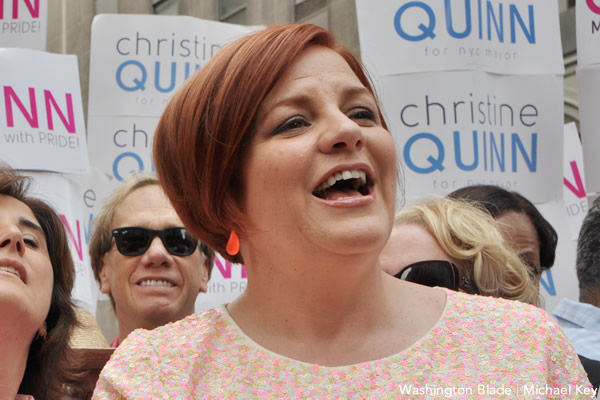
Lesbian Christine Quinn started her mayoral campaign a heavy favorite but ultimately lost in New York’s primary. (Washington Blade photo by Michael Key)
Lesbian Annise Parker won election to her third and final term as mayor of Houston, on Nov. 5, receiving a decisive 57 percent of the vote in a nine-candidate race.
In Seattle, Washington State Sen. Ed Murray defeated incumbent Mayor Mike McGinn by a margin of 56 percent to 43 percent to become that city’s first openly gay mayor.
And in Atlantic City, N.J., gay Republican Don Guardian shook up the political establishment by winning an upset victory over incumbent Mayor Lorenzo Langford, a Democrat, in a city where Democrats outnumber Republicans among registered voters by a nine to one margin. Guardian ran as a socially progressive reform candidate with a record as a highly competent administrator of services for the city’s tourist district.
Meanwhile, New York City Council Speaker Christine Quinn lost her race to become New York’s first openly gay and first female mayor, finishing third in a hotly contested Democratic primary in September. A New York Times exit poll showed pro-LGBT candidate Bill deBlasio, who won the primary and the general election in November, beat Quinn among LGBT voters by a margin of 47 percent to 34 percent in a four candidate race.
Most political observers said LGBT voters joined the majority of their straight counterparts in backing deBlasio, who emerged as more progressive on economic issues than Quinn and who was perceived as an outspoken critic of incumbent Mayor Michael Bloomberg, who is highly unpopular among Democratic voters. Quinn had long been viewed as a Bloomberg ally.
# 10 Manning gets 35 years, comes out as trans

Manning announced she is transitioning one day after being sentenced for leaking classified documents. (Public domain photo)
One day after a military judge sentenced former U.S. Army Private Bradley Manning to 35 years in prison for leaking classified documents to Wikileaks, the 25-year-old soldier released a statement through her attorney coming out as transgender.
“As I transition into this next phase of my life, I want everyone to know the real me,” Manning said. “I am Chelsea Manning. I am a female.”
Manning’s dramatic announcement shifted the media focus from that of her conviction in an Army court martial proceeding of violating the U.S. Espionage Act for leaking an unprecedented amount of classified information to the issue of who transgender people are and whether they should be entitled to equal rights.
Some transgender rights advocates said Manning’s case would hurt efforts to lift the military’s ban on transgender service members by casting transgender people in a negative light. Transgender activists Brynn Tannehill and Autumn Sandeen, who served in the military before transitioning, said they were especially troubled by arguments by Manning’s attorney that Manning’s struggle over her gender identity created stress that played some role in her decision to leak classified information.
“In my last four years in the Navy I was grappling with gender identity yet I did my job” and didn’t release classified information,” Sandeen said.
By Lou Chibbaro Jr., Chris Johnson and Michael Lavers
National
Human Rights Watch sharply criticizes US in annual report
Trump-Vance administration ‘working to undermine … very idea of human rights’

Human Rights Watch Executive Director Philippe Bolopion on Wednesday sharply criticized the Trump-Vance administration over its foreign policy that includes opposition to LGBTQ rights.
“The U.S. used to actually be a government that was advancing the rights of LGBT people around the world and making sure that it was finding its way into resolutions, into U.N. documents,” he said in response to a question the Washington Blade asked during a press conference at Human Rights Watch’s D.C. offices. “Now we see the opposite movement.”
Human Rights Watch on Wednesday released its annual human rights report that is highly critical of the U.S., among other countries.
“Under relentless pressure from U.S. President Donald Trump, and persistently undermined by China and Russia, the rules-based international order is being crushed, threatening to take with it the architecture human rights defenders have come to rely on to advance norms and protect freedoms,” said Bolopion in its introductory paragraph. “To defy this trend, governments that still value human rights, alongside social movements, civil society, and international institutions, need to form a strategic alliance to push back.”
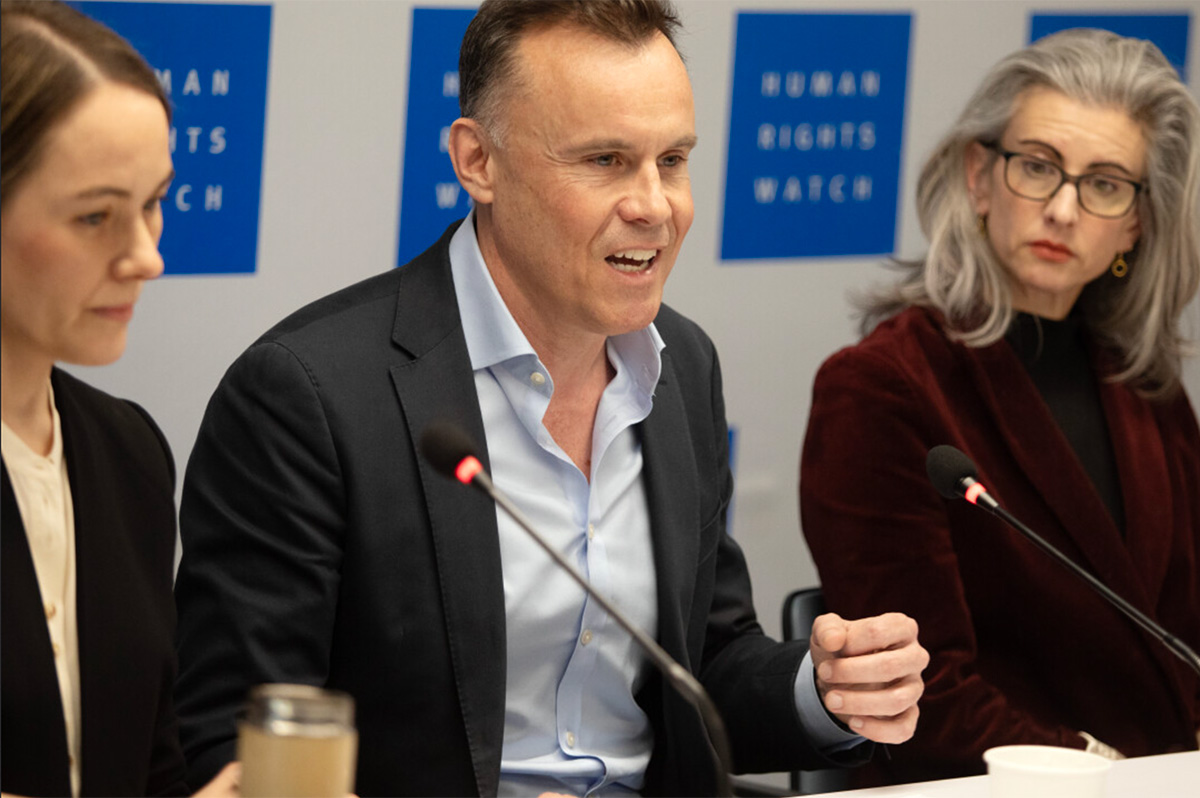
The report, among other things, specifically notes the U.S. Supreme Court’s Skrmetti decision that uphold a Tennessee law banning gender-affirming medical interventions for minors.
The Trump-Vance administration has withdrawn the U.S. from the U.N. LGBTI Core Group, a group of U.N. member states that have pledged to support LGBTQ and intersex rights, and the U.N. Human Rights Council. Bolopion in response to the Blade’s question during Wednesday’s press conference noted the U.S. has also voted against LGBTQ-inclusive U.N. resolutions.
Maria Sjödin, executive director of Outright International, a global LGBTQ and intersex advocacy group, in an op-ed the Blade published on Jan. 28 wrote the movement around the world since the Trump-Vance administration took office has lost more than $125 million in funding.
The U.S. Agency for International Development, which funded myriad LGBTQ and intersex organizations around the world, officially shut down on July 1, 2025. The Trump-Vance administration last month announced it will expand the global gag rule, which bans U.S. foreign aid for groups that support abortion and/or offer abortion-related services, to include organizations that promote “gender ideology.”
“LGBTQ rights are not just a casualty of the Trump foreign policy,” said Human Rights Watch Washington Director Sarah Yager during the press conference. “It is the intent of the Trump foreign policy.”
The report specifically notes Ugandan authorities since the enactment of the country’s Anti-Homosexuality Act in 2023, which punishes “‘carnal knowledge’ between people of the same gender” with up to life in prison, “have perpetrated widespread discrimination and violence against lesbian, gay, bisexual, and transgender (LGBT) people, their families, and their supporters.” It also highlights Russian authorities “continued to widely use the ‘gay propaganda’ ban” and prosecuted at least two people in 2025 for their alleged role in “‘involving’ people in the ‘international LGBT movement’” that the country’s Supreme Court has deemed an extremist organization.
The report indicates the Hungarian government “continued its attacks on and scapegoating of lesbian, gay, bisexual, and transgender (LGBT) people” in 2025, specifically noting its efforts to ban Budapest Pride that more than 100,000 people defied. The report also notes new provisions of Indonesia’s penal code that took effect on Jan. 2 “violate the rights of women, religious minorities, and lesbian, gay, bisexual, and transgender (LGBT) people, and undermine the rights to freedom of speech and association.”
“This includes the criminalization of all sex outside of marriage, effectively rendering adult consensual same-sex conduct a crime in Indonesia for the first time in the country’s history,” it states.
Bolopion at Wednesday’s press conference said women, people with disabilities, religious minorities, and other marginalized groups lose rights “when democracy is retreating.”
“It’s actually a really good example of how the global retreat from the U.S. as an actor that used to be very imperfectly — you know, with a lot of double standards — but used to be part of this global effort to advance rights and norms for everyone,” he said. “Now, not only has it retreated, which many people expected, but in fact, is now working against it, is working to undermine the system, is working to undermine, at times, the very idea of human rights.”
“That’s definitely something we are acutely aware of, and that we are pushing back,” he added.
Maryland
4th Circuit dismisses lawsuit against Montgomery County schools’ pronoun policy
Substitute teacher Kimberly Polk challenged regulation in 2024

A federal appeals court has ruled Montgomery County Public Schools did not violate a substitute teacher’s constitutional rights when it required her to use students’ preferred pronouns in the classroom.
The 4th U.S. Circuit Court of Appeals in a 2-1 decision it released on Jan. 28 ruled against Kimberly Polk.
The policy states that “all students have the right to be referred to by their identified name and/or pronoun.”
“School staff members should address students by the name and pronoun corresponding to the gender identity that is consistently asserted at school,” it reads. “Students are not required to change their permanent student records as described in the next section (e.g., obtain a court-ordered name and/or new birth certificate) as a prerequisite to being addressed by the name and pronoun that corresponds to their identified name. To the extent possible, and consistent with these guidelines, school personnel will make efforts to maintain the confidentiality of the student’s transgender status.”
The Washington Post reported Polk, who became a substitute teacher in Montgomery County in 2021, in November 2022 requested a “religious accommodation, claiming that the policy went against her ‘sincerely held religious beliefs,’ which are ‘based on her understanding of her Christian religion and the Holy Bible.’”
U.S. District Judge Deborah Boardman in January 2025 dismissed Polk’s lawsuit that she filed in federal court in Beltsville. Polk appealed the decision to the 4th Circuit.
Minnesota
LGBTQ Minnesotans speak out amid ICE crackdowns
‘Our nervous systems are not set up to live under constant threat’

Uncloseted Media published this article on Jan. 31.
By HOPE PISONI, SAM DONNDELINGER, SPENCER MACNAUGHTON, and TAYA STRAUSS | Since the start of December, Minneapolis and St. Paul, Minn., have been under the thumb of an extremely heavy presence of the U.S. Immigration and Customs Enforcement.
During the crackdown, which the agency refers to as “Operation Metro Surge,” at least 3,000 people — mostly undocumented immigrants — have been arrested so far. Tensions came to a boil in January when federal immigration enforcement agents shot and killed poet Renee Good and ICU nurse Alex Pretti on separate occasions. In response, Minneapolis-area residents have started to push back. On Jan. 23, Minnesotans organized the first citywide general strike in the U.S. in nearly 80 years, with tens of thousands protesting and over 700 businesses closing in solidarity. And additional protests are taking place nationwide in at least 36 states over Jan. 30 and 31.
Many queer people have been on the frontline of these protests. We spoke with six people on the ground in the Twin Cities to learn more.
Watch the full interview above or read the transcript here:
SPENCER MACNAUGHTON: Hi everyone, I’m Spencer Macnaughton, and today I am here with six queer folks from the Minneapolis area. Everyone, thank you so much for speaking with me and Uncloseted Media today.
ALL: Thanks for having us.
SM: Yeah, great to be with you. And obviously we reached out to you all based on the headlines. And a lot of what’s playing out at the national level is happening right there in Minneapolis where you guys live. And I just wanted to start to really get a pulse check. How are you guys feeling right now? I have not been in Minneapolis. For folks who only see what’s unfolding on social media or on TV, take us inside what life has been like for you all the past few weeks.
RACHEL DOMINGUEZ: It’s incredibly stressful. Our nervous systems are not set up to live under constant threat. That’s the biggest thing that I think people are not understanding about what’s going on. And I’ve lived in Minneapolis for 41 years. We had a little dress rehearsal for this about five years ago, but it was nothing — there was no precedent. There’s no precedent for this. It’s like water about to come to a boil. Everyone here is stressed out. We’re angry. We’re scared for our safety, for our neighbors’ safety, for our livelihoods. We have no idea when this is gonna stop. Oh, and it’s two fucking degrees out.
JUNE REICHERT: It’s hard to go on like normal when this is happening. Part of my, and I’m sure everybody in your profession, is to not even acknowledge it. Pretend that everything’s okay while you’re at work, while you are going to school, while you are going shopping and everything. And little do you know, down the street, a Somali family is being harassed for no good reason. It brings this feeling of sorrow, especially when it does affect your professional life. When somebody who you’ve been working with for a long time, all of a sudden, as part of my job, I can’t get a hold of them. I work with a lot of people from the Hispanic community and they’re just gone. And you just sit wondering. It’s horrible. It’s a horrible feeling.
SM: And June, tell me more about that. That actually happened?
JH: So for what it’s worth, I sell insurance. I have had clients who have been picked up and I can’t get a hold of them. I mean, I can verify what happened to them, but these people I’m able to get a hold of every single day when I need to, to take care of this, that or the other issue. And now I can’t get a hold of them for a week straight. What am I supposed to think? You know?
SKOT RIEFFER: My day job, I work for a catering company. We have no work at my catering company for the next two months because every single event has canceled because of the ICE occupation. And these events are things from corporate events to weddings. And we’re all now without a job, essentially. My catering company is maybe 30 percent white people and so all of us are checking in with everyone else all the time. One of our folks, also a member of the Hispanic community, has lost four family members. They just got kidnapped. And they’re just gone.
ALICIA KOPP: I am the child of a migrant. I’m from a mixed heritage. My father is from Guatemala. He’s been a citizen since ‘83. Right now, we’re not letting him leave the house. We’re running all errands. The stress that you had spoken to earlier, Rachel, that is definitely wearing thin on all of us.
SM: I mean, what type of mental health effects is that having on him by not being able to leave the house and also probably understanding the reasons why he’s not leaving the house?
AK: When I handed him things like, I showed him what was in a whistle kit with the red cards. This is an emergency contact card. On the inside, the top part says, “help me,” and it’s got whoever’s holding it, their information. The bottom has their loved one and their lawyer and contact information. And they carry this in one of these red cards that on one side has your constitutional rights and on the other side says what you would tell to an immigration agent if they tried to stop you. Or you would just put it up to the window in your car or slip it through, so that you don’t have to talk to them. Now, what good it does? Yeah, I don’t exactly know. Because they’re not exactly following the rules, they kind of tell a lot of people, “That doesn’t matter, we don’t care.” But with this contact card, you have it on you, you literally hand it to somebody if you feel like you’re about to get picked up and say, “I need help. Contact this person for me.” Trying to explain to my dad why, even though he’s a citizen now, I wanted him to have this on him if he’s leaving the house? That was hard. And he was a little belligerent at first. I’m just like, “Look, you’ve kept me alive for 50 fricking years. It’s my turn to do the same for you. And right now, they don’t care that you’re a citizen. They just see you and they go, ‘Yep, we don’t want him here.’ And they’re gonna take you away. You’ll be away from your medicine. You’ll be away from us. It will take us how long to figure out where you are.” Even if it’s like hours, that probably isn’t great for somebody that probably shouldn’t be rassled to the ground by young dumb men or women or whoever they are. But you know, it’s hard. It’s really hard for him and it’s hard for all of us because you don’t wanna have to talk to your parents like that.
TERRESA HARDAWAY: I just wanted to comment on how I’m feeling in this moment, and I would say that while I am tired, I’m not exhausted. And it’s because Black people have always been under occupation. And I’m so happy that people are coming to the realization that state violence and national violence is something that affects all of us. But I gotta say my exhaustion probably comes from the long story posts and the Instagram posts of people realizing for the first time that they are also a part of this system. And they realize that they are also subject to be attacked and to be violently murdered in the street, just like Black people, I think that’s where my exhaustion might come in. But I will say, because we are used to this, I know that this is not gonna be the final moment. I don’t want to hold onto this hopelessness that I feel like a lot of folks who are just coming into that realization are starting to feel on their own. And so we have to just keep fighting. And as tired as we are, now is the time for us to actually push the system that we want to stop harming our neighbors.
SM: And how do you push a system in this moment? What is the strategy in terms of pushing? Because, you know, it does feel like a moment where change could happen because there’s so much attention on it.
TH: There are many, many ways that folks can tap into mutual aid networks, can tap into organizations who have been advocating for immigrant rights and equity in those spaces. If there are holes within our neighborhoods that need to be filled, people need food, people need supplies, and they aren’t comfortable leaving their house, there are organizations who have already been doing that work that people can tap and support. People can become legal observers. There is a lot of things that folks could do. This anxiety that I know that we’re all feeling and this exhaustion? I would say focus that into some of the work that’s already happening.
RD: My kid has only gone to Southside Family School for his entire life. That’s where Renee Good, that’s where her kid went. Still goes there actually. So, our kids, first off, they couldn’t be in school. Because the New York Post ran some bullshit article about how our school was some like communist indoctrination training center that recruited her to join an ICE watch. And then all of a sudden death threats, bomb threats, people coming into the teachers’ houses and knocking on the doors and running away. Bomb threat, they had to bring the dogs in. So my kid didn’t even get to go to school for two weeks and now they’re back in school in a secret location. Like this is the fucking Taliban that we’re hiding from.
SM: Wow.
RD: I can’t even say where my kid goes to school. We’re not even supposed to text it.
SM: I’m sorry you have to do that. And I, yeah, and we’ve all seen those harrowing headlines and images of children as young as 2, as young as 5, being taken by ICE over the last few weeks. I wanted to ask more broadly, for the kids you guys know in your life, what is the impact this is having on children?
AK: A lot of stuff for kids are being canceled. I know that the Minnesota Orchestra has canceled their Young People’s Concert Series for the time being because it’s just not safe to go down there. The students that auditioned last spring to be part of the All State Ensembles, all of their concerts have been canceled because it is just not safe.
SR: My partner and I have started doing neighborhood patrols because there’s a daycare two houses down from ours that caters to our small little, poor community around here and everything like that. And so there’s a lot of different folks who go to this daycare. And so every morning from 7:30 ‘til 10, I’m out there, and then from 3 until 5, which is the pickup times. And so we’re out there as observers.
And there’s been some real scary things, and one thing that is really burned in my head was this dad came up and was chatting with me and thanking me for being there and whatnot. He said to me that his kid, his daughter came up to him and asked him, “Dad, what do I do when the men come and take my friends?” And he didn’t have an answer and he was like, “I feel like my job as a dad is to be able to answer these questions and I do not have an answer” and he was sitting there, and we’re outside, it’s –10 and he’s crying. And I’m crying. And our tears are freezing to our damn faces and all I can do is just nod and hug this guy and just be like “yeah, I don’t have an answer either, man.”
SM: You mentioned the ICE patrolling. Tell me about what that is, what you do and why you’re doing it.
SR: We’re just looking for suspicious vehicles. So if out-of-state plates, a slew of identical looking SUVs drive by, we’re marking it, we’re reporting it to the other people in our Signal groups and everything like that. And then in the situation, just the other day, there were three black SUVs that drove by, all of them with ICE agents in full equipment, everything. So we reported all of that. We’re monitoring, we’re taking pictures, we are marking plates, we’re running plates if needed, and just letting every — like there’s a Hmong Market just down the road, and so we let them know. There’s a small, kind of a strip mall that’s almost all owned by people of color, and we call one of them and then they distribute the word and they’ll lock their doors if we see anyone. Just things like that.
SM: When you say you report it, who do you trust right now to report to?
SR: Our neighbors.
SM: Your neighbors.
SR: We have a Signal group, I’m part of several Signal groups. I will get called. Someone will tell me and be like, “hey, we need a big white guy here right now.” And I will show up. And then when I get there, I see things, I take pictures, I send it to that group and I send it to my group of my immediate block of neighbors. And so then they all know, and then they’ll either go check on the neighbors next door who didn’t respond in the group or will drive to the daycare or whatever is needed to do.
SM: Maybe this is a dumb question, but why do you think they’re saying “we need a big white guy”?
SR: I mean, I’m just as likely to get shot and killed and kidnapped and everything as anybody else at this point. But if they’re trying to push the agenda that these types of people are bad people and whatnot, and if in every camera frame that they have, if there’s someone who looks just like you? That bullshit narrative, it’s harder for them to sell it. If I’m standing there, it’s harder for them to sell it. And I hate it. It sucks on so many levels, obviously.
SM: Can people talk about what they’re doing to push back?
TH: Yeah. I think for me and my teams at Blackbird Revolt and Black Garnet Books, we have these spaces. And so this is something that we didn’t have in 2020. And so being able to activate these spaces, hosting a poster making and community space for folks to come together who do feel similarly and just want to be in space with each other has been really amazing. We are also holding a drive where folks can purchase a book, that’s either in English, Spanish or Somali, that we’re able to deliver to families that don’t feel comfortable leaving their homes.
RD: The people here, we don’t have any faith in the politicians, that they’re going to do anything meaningful or that they have any power at all. We don’t have any faith that the police are going to protect us or that the National Guard is gonna protect us or that Tim Walz or Jacob Frey or any of them are gonna be able to protect us.
SM: Why don’t you feel like you have faith in Jacob Frey? I mean, when I see him on TV and he’s saying “get the hell out,” it seems like he’s giving his best effort, but is that a sentiment that is not felt on this call?
SR: It’s super fucking easy to say “get the fuck out.” We’re all saying that, but all of us are also in the street. All of us are also helping, donating food, donating time. Where the fuck has he been?
TH: I’m seeing the real people who are standing up for these communities out at the protest. I ain’t never once seen that man and that man just stay talking shit and never moves and never has any action behind it. Fuck that man. Fuck all of this whole, “get the fuck out.” Stop, anybody can say a cuss word, but you actually have the power to pass policy and you’re not doing it. So it’s not about not having faith. We have a history of seeing them say shit and then not backing that up with action. So it’s not about faith. We have a historical record of y’all not doing shit for the people.
SM: So let me ask then quickly, what do you want him to do? What could he do that would be meaningful right now if he could actually do, that’s within his power?
JH: If you don’t want to start a constitutional crisis by arresting an ICE officer while he’s doing the awful things that he’s doing, fine, I guess. I would argue differently.
RD: No, that’s not fine. That’s what they should do. That’s what they could do.
JH: Correct.
RD: They could get some fucking balls and call the commanders into their office and say, “Look, are you loyal to the constitution or are you a Nazi that’s gonna fold?”
JH: If these people want to preserve whatever level of normalcy that we know has not existed as Rachel, Terry and Alicia have all described, then citations, parking violations, trespassing violations, these people are using their administrative warrants, that are not admissible to use to enter people’s homes, to enter people’s homes. And they aren’t getting trespassing citations for that. They aren’t getting charged for that, I don’t even think the mayor has talked about the fact that they’re doing that. And these are all things that are actions that can be done instead of tweeting really hard. I want action. I don’t want words. I don’t want you to look like a big tough guy and to get all the people on Twitter or Bluesky or whatever to go, “Oh, he owned him.” I want them gone. I don’t want them here anymore.
SR: He could at the very least talk to us. All he’s doing right now is talking to the media. Talk to us, show up. Maybe he’s doin’ shit behind closed doors. Okay fine, but tell us. Talk to us. Come out, listen. Talk. Be present.
SOREN ASTER: One thing we did at the clay pit as well is I changed it to appointment only. I did as much research as I could on how to keep ICE from coming into the public space of my business, and I found that by making it by appointment only, the whole space becomes private and they cannot come in. So my door stays locked. I let people in as I see fit, but just as another form of precaution, keeping those doors locked. It’s an absolute nightmare.
SM: It literally sounds like it’s created a situation where every move you make is nerve-wracking because of what’s happening.
SA: Absolutely.
SM: I’ve heard many people saying that what’s unfolding in Minneapolis is a queer story. And I find that interesting. And I’m curious, do you guys agree with that?
JH: I want to push back a lot on the idea that this is a very queer thing that’s happening. As a transgender person, I’ve been a community activist for quite a while, especially in 2022 when the federal government, from my perspective, was failing to protect my trans siblings in states like Florida and Texas. There’s a lot of my activism that I do that is directly fueled by my queer identity. My neighbors, my friends, my colleagues, my clients even, are being attacked by a force that is an invasion to our city and our state. And it is on me as a human with human emotions and a personal connection to this place to protect my community, and that’s got nothing to do with me being gay. The motivation is, in this instance, for one of a very rare time in my experience, very disconnected from my queer identity. It’s got more to do with protecting Minnesotans. It’s got more to deal with protecting communities, immigrant communities and communities of color who people who look like me, as we’ve discussed here, famously just don’t even bat an eye at, and it’s wrong.
SA: I don’t think it’s an inherently queer thing, but I think that queer people and Black and Brown people are used to having to rely on our community, rather than our government and other people to get the things that we need and to get the support and to make things happen. We’re used to having to riot, and we’re used to having to scream and try and get people to listen to us and our stories. And so I think when this started. The first people that really knew what to do and how to do it and how to organize are those people. And so I think that it’s one part of the story.
SM: One thing we had mentioned earlier is what happened in Minnesota in 2020. Many have compared what’s happening now to the George Floyd protests of 2020. Um, how do you guys compare it? How is it different? How’s it similar?
AK: The big difference? We knew who the police were, we kind of know who these people are, but we don’t know who those people are. We know that they are some of the same people that were let out of the Jan. 6 stuff because of the pardon. And we know they’re likely a lot of the cops that left the profession because they couldn’t beat up on people so freely in Minneapolis anymore with some of the initiatives that have been trying to change the culture of our police forces.
Editor’s Note: While some government officials, including U.S. Reps. Jamie Raskin (D-Md.) and Steve Cohen (D-Tenn.) have called for the DOJ to release information on any participants of the Jan. 6 insurrection employed by ICE, no details have been published. Additionally, several police chiefs and sheriffs have reported that ICE has tried to poach their officers for recruitment, but Uncloseted Media was unable to confirm any cases of this in Minneapolis.
TH: I think for me, I compare it to the longevity of support that’s gonna be happening. I think that after a year, after the protests, after the uprisings, it went back to business as normal, business as usual. I’m also a runner. And so when I’m gonna run a short distance, if I know I’m just trying to get a fast-ass time running a mile, I’m gonna run at that at full velocity. And I feel like people who are just getting activated, that’s what they’re doing. They’re running at it at full velocity and then they get exhausted. Y’all need to run this as if it’s gonna be a 50 mile race. I think for me, how I was activated during the uprisings, I’m really leaning on community. I am texting my group of white allies and being like, “Y’all, I need y’all to pick this up. I need you to help me here, dah dah dah.”
JH: It is unfortunate to me that many people, similar to in 2020 and 2021, will see the immediate aftermath of something and see Derek Chauvin got arrested or whatever it is, and they’re done. And that’s it. And we made the change. And now we can go back. It’s a joke in my community: We can go back to brunch. No we can’t. We’re not done. And they think once ICE is out of Minneapolis and the white people stop dying, then they can just go back to sipping their tea. And I’m worried about that. So it’s a push and pull, and I really want to remain optimistic, and I know there is a future worth fighting for. But I’m also worried that some people will see the short-term victories and give up.
SM: Trump has said that Minnesotan protesters are “left-wing agitators.” I want to know, maybe as a last question, I want to know, how important is protest and what else is getting you through right now?
AK: Well, protest is very important to me, but also understanding the multitude of ways that you can participate in protest. You don’t have to be out necessarily facing off with people that are on an opposing side. You are doing protest by maybe doing a Zoom concert because your concert got canceled and you’re still going to play. Or by delivering food for neighbors and other health and home needs, like laundry detergent is a huge one right now that people need as well as just things like shampoo and soap.
SA: All of the reactions that have happened are really logical when you think about it from an outside perspective. If you take out left and right and the political ideologies of it all, people are coming in and abducting people that are here, mostly not committing crimes. A lot of people, perfectly legal. In any other situation, I think the logical answer would be to fight back and to step up to your community and do what you can to prevent those kidnappings and to prevent that violence from happening.
TH: Protests were so important that it is the first amendment. And so when we get asked things like, “Why are we protesting?” The country was founded on that. I don’t want people to just only relate it to Black people or just to trans people. It was something that was laid at the foundation of this country. We do get to say what we want our government to do and protest is our way of being able to speak out about that. And if you weren’t comfortable with that, you shouldn’t have ran for president.
-

 District of Columbia5 days ago
District of Columbia5 days agoD.C. Council gives first approval to amended PrEP insurance bill
-

 2026 Midterm Elections5 days ago
2026 Midterm Elections5 days agoLGBTQ Victory Fund looks beyond Washington for change in 2026
-

 National5 days ago
National5 days agoHuman Rights Watch sharply criticizes US in annual report
-

 Italy5 days ago
Italy5 days ago44 openly LGBTQ athletes to compete in Milan Cortina Winter Olympics

















